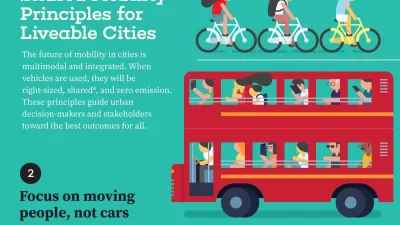Todd Litman
Todd Litman is the executive director of the Victoria Transport Policy Institute.
Contributed 446 posts
Todd Litman is founder and executive director of the Victoria Transport Policy Institute, an independent research organization dedicated to developing innovative solutions to transport problems. His work helps to expand the range of impacts and options considered in transportation decision-making, improve evaluation methods, and make specialized technical concepts accessible to a larger audience. His research is used worldwide in transport planning and policy analysis.
Mr. Litman has worked on numerous studies that evaluate transportation costs, benefits and innovations. He authored the Online TDM Encyclopedia, a comprehensive Internet resource for identifying and evaluating mobility management strategies; Transportation Cost and Benefit Analysis: Techniques, Estimates and Implications, a comprehensive study which provides cost and benefit information in an easy-to-apply format; and Parking Management Best Practices, the most comprehensive book available on management solutions to parking problems. Mr. Litman is a frequent speaker at conferences and workshops. His presentations range from technical and practical to humorous and inspirational. He is active in several professional organizations, including the Institute of Transportation Engineers and the Transportation Research Board (a section of U.S. National Academy of Sciences). He is a member of the Editorial Advisory Board of Transportation Research A, a professional journal.
Public Transportation Provides a Vital Mobility Link in Rural and Small Towns
A new report describes the important roles that public transit plays in rural communities and small towns, current demographic and economic trends that are increasing these demands, and examples of successful rural transit development programs.

The Many Problems With Autonomous Vehicles
Optimists predict that autonomous vehicles will be a transportation panacea, but there are good reasons to be skeptical. They may create as many problems as they solve.

The Future of Mobility in Cities: Multimodal and Integrated
Ten principles developed by international non-governmental organizations are designed to guide urban decision-makers toward the best outcomes for the transition to new mobility options.

Responding to Public Transit Criticism
Critics often use fallacious arguments and inaccurate evidence to attack public transit and Transit Oriented Development. Here are suggestions for responding to their false claims.

Houses Appreciate. Cars Depreciate. Walkable Urban Neighborhoods Help Families Build Wealth.
Walkable urban neighborhoods tend to have more expensive housing but cheaper transport. By shifting spending from vehicles to housing a typical household can build a million dollars in additional equity by choosing a Smart Growth location.

























